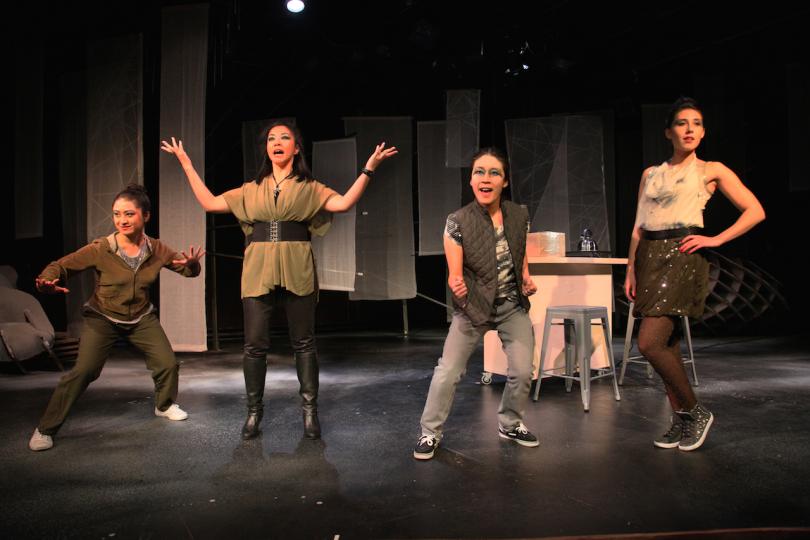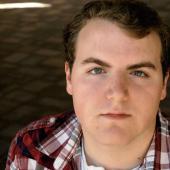Emerging Artist Profile: Jessica Huang

Multiple studies have revealed that only around 20% of plays produced at large regional theaters are written by women--even less are written by women of color. So how does Minnesota-native Jessica Huang to prepare for the artistic battle to have her voice voice heard? By using her background in journalism, knowing when to listen to her characters, and harnessing an intense passion to create inclusivity with her writing.
Who are you?
I am a woman. I am mixed race. I am a playwright. I am an artist. I was born in upstate New York but my folks moved to Chanhassen when I was four or five. I used to called it Chan-Happening - back in the day. I went to Missouri for college and studied Journalism.
Why journalism?
I wanted to be a writer when I grew up. I just didn’t know what I wanted to write. Then I graduated as the economy took a nosedive. I was one of the lucky few who had a job out of college. I went to Arizona on the Pulliam Fellowship to work at the Arizona Republic. It ended up being five or six months; they offered me a job at the end but I thought, “I don’t want to do this!”
You didn’t like Arizona?
No, it was really hot and it was really...racist. In my experience! I am sure that there are plenty of non-racist people there. It was a different experience than what I was used to. I felt really isolated. I spent any day off writing plays - like I learned to do in college as an elective. I realized, “This is saving my life!” I was having this experience [at the newspaper] to be fair and unbiased in a place I was seeing huge problems. I write to address the problems I see, and I felt really choked off by that restriction. I wasn’t able to express the politics at my work so I used plays to spew out all of the tough things I was seeing; I escaped into those worlds I was creating.
I came back [to the Twin Cities]. I had this moment when I was driving to a meeting with a friend I met in college. One of my short plays I wrote in this elective class won the regional ACTF award, and it went on to the national competition. It ended up being performed at the Kennedy Center - and here I was, a journalism major! Anyways, that friend I met at the festival ended up here in Minneapolis as a Many Voices Fellow at The Playwrights’ Center. I was in the car driving to meet him and was like “Fuck it. I’m just going to be a playwright! I don’t care!” That night we formed The Unit Collective.
In college, I didn’t know that people wrote plays. I did theater in high school and loved it but wasn’t very good at acting. I love the people and the community. I was really missing that, so I auditioned for a play - a new play - and got in. That was when I was like “What? People write plays!?!” I connected to that community, and we met every Tuesday in the basement of the Union reading each other’s plays. I went as an actor but ended up writing my own. I guess I was good enough to skip beginning playwriting and went straight into intermediate. That’s how I got my theater education.
Do you feel not having that theater background - either starting out or now - was a disadvantage to you?
I have the knowledge. I didn’t take a theater history class but I gave myself a theater history class - that’s what I do. I continue to research what I think I need to know. And that way I can give me the education I feel like I need. It teaches me how to research.
So then do you want to continue on to graduate school? Get an MFA in Playwriting?
No I do not - I find my education elsewhere.
It can be controversial. There are some people who really love their fine arts degrees - and I think that’s awesome for them. I just know that I am a woman, and I am of color. I don’t do well in settings that aren’t necessarily set up for people like me, and I personally don’t think higher education is set up for people like me. I seek out my mentors and try to read all the things I should read. I practice writing and I met with other writers; all of these other things give myself that theater background I need.
How then would you describe your writing style?
It’s mixed - like I am. I come to theater through literature, music, and a lot of other avenues. I am not sure if that is a division anyone else has made but me, but I use a lot of technique that I see in novels and music I care about. The musician Patty Smith and the short story novelist Anne Poet are important to me. Jorge Luis Borges is another - I am interested in how his writing technique translates to theater. And then there’s all the Asians. There is such a long list of Asian-American writers that matter to me. So there’s a mix - like me!
So with all of those influences in you, what is your process as a playwright? How does Jessica write a play?
It depends on the project - I think each project determines its own project. I think that’s where I feel the most “emerging”; I am still having that conversation with myself on what works best. One [consistent] thing is that I keep a journal. I write to myself as I am writing a play. From those [journal] writings, I see I am devising a process [on playwriting].
It does however start with a lot of research. The play I am working on at the History Theater is about a Chinese immigrant named Harry Chin. He came to America during the Chinese Exclusion Act. He had to immigrate using forged documents, which made him a Paper Son. I am writing his story so that process involves everything from reading books on the subject [Jessica gestures to a pile of books.] There’s just a good chunk of just straight up fucking reading! I have done interviews as well with his daughter and other members of the Chinese-American community members who knew him. I have also had meetings with historians who help me contextualize Chinese exclusion at that time and in this state. Pictures help as well - I just look at his face. He also has an oral history that I just listen to over and over again. I even filed a FOIA request to get his immigration papers.
So it's just like I need to have a grasp on him, his family, who knew him, and the time. Then out of all of that - like a magic eye - the play appears. Like, if you squint just right you can see it. You just need to take that stab at it.
I also do diagramming and have an outline - it is very intentional [with the writing]. I just need to know the next three turns, but even though doing that entire intake, I think at some point the character is just like, “Hey, I am here and this is my story.” So then I just need to get out of their way and listen to them. It is really a lot of listening.
What is your advice to budding playwrights?
Work hard and know that you have the right to “be” and “do” whatever is authentic to you. There are no rules. I believe we have all of these norms that we set up, and you don’t need to pay attention to any of them.
Oh! And don’t give yourself any outs and pay attention to the world - listen really hard!
What would you say then is good play development? Or should I say an effective way to develop new work?
Well, I think that it is important to have a community around a play. But it is also important to give the playwright time to write.
I really like to have collaborators I can trust. I really like working with actors; when actors are in a room that appreciates the breath of their skills, the collaboration between an actor and a playwright is the “thing”. It’s magic!
I have a bird’s eye view - I am paying just enough attention to the stage directions as I am to a character, but an actor comes in and falls in love with one person. Actors are there to advocate for that character. And then the director has to see it from another perspective. That “zoom technology” is what really gets things going.
Oh, and designers! Don’t get me started on designers! Having a designer in the process is also so wonderful. To have someone say, “Yes! And have you thought about lighting here?” Doesn’t that change how the conversation happens? Theater is a collaborative form for a reason; the more collaboration, the better. But then it is important to have time to go off to write and process all the wonderful information.
People in this field are so smart so not using all their smarts feels like a huge waste of opportunity.
So we’ve talked a lot about developing the art, but how do you survive with the art? How do you make a living as an emerging playwright?
I hustle! But like in a friendly way. I don’t walk around schmoozing people. I have ideas and have been really lucky finding people who have similar goals and ideas to me.
I do have a “supplement job” of grant writing. It used to be that I earn 100% of my financials from this freelancing and now I earn half of mine from it. But I also teach and do community engagement - you kind of cobble it together to make a living.
There is something to knowing business and being your own boss. So in my case, if Jessica Huang’s Business’ motto is “We do grants and we do plays” then that’s fine. But if some day it becomes “We do plays and we do TV”, then that’s cool too! You just need to be your own business, whatever that means to you.
You said that you “hustle” in the American theater scene. How do you describe that scene?
I feel that we have made great strides in representing America in the American theater scene, but we have a long way to go. I hope we continue to push ourselves in representing America and connecting audiences to the stories.
Do you feel that the Twin Cities is a good home for playwrights? I have heard from many playwrights that plays that premiere here stay here. Is this true?
I really value the relationships I have here. I think that the people I am working with make this a really great home. There are things that you get working in other cities, like exposure - which is another word I hate! I think of someone flashing someone on the street. But anyways, I feel that it is easier to build some kind of presence in those places. But the flipside of that is with here, you get to build really meaningful relationships with collaborators. Like for me, Randy and Mu are great collaborators - and all of those people make this city feel like home.
I think that the Twin Cities have the potential to do all of the things if it wants to. The work to have a national presence as a region comes from everyone however. For me, I have to go to those other cities and be like, “I am from the Twin Cities and this work represents that.”
If we don’t want this place to be the stereotypical “fly over” place that people think of, then we all need to be ambassadors of our artistic home.
Many times the life of a playwright is “writing and submitting” on endless repeat. How do you deal with having your fate in the hands of others?
I just don’t think my fate is the hands of others. I mean sure, I write and submit plenty, but in that case my job is to submit and not expect to receive. I am never attached to the outcome of a submission. I know the strange and arbitrary nature of submitting. It is like with grant writing: my job is to submit the best report I can and then the rest is in the hands of the universe. The same goes with playwriting.
But then I feel like I am a good collaborator and bring ideas to the table, so more and more these days it is becoming a conversation with people [about producing my work].
I don’t fit well in hierarchy.
So then do you value self-producing for playwrights?
Yes! Do it all. As they say, “Diversify your portfolio”. I say “Diversify your skillset.” Learn it all so you can self-produce and so you can work within an organization. When I work at a table, I bring actors with me. I bring communities with me. I work really hard; when you’re working with me, you’re not just working with a writer but a person with a whole holistic skillset. That is one skillset with me.
Do it all and then you will always have irons in the fire - whatever that cliché means.
You are a female writer and a female writer of color. What has been your experiences with that background? Any advice to younger, female writers of color seeking a profession in playwriting?
OK, hold on. I need to make two notes.
[Jessica grabs a sticky note from her desk and scribbles bullet points to herself.]
I am a better writer than I am a talker. Ricardo [Vazquez, Jessica’s husband] can go on any interview and sound brilliant; I wish I could just write a script for myself.
Alright, so, number one: I will never not be a woman, and I will never be white. I pass really well so there are rooms that think I’m white, but as soon as they learn I am not, everything changes. No matter what. That’s the reality.
[My advice is that] you have to find a way to navigate the world with grace. You can look at the statistics and see that the numbers are against you. That is something that exists right now.
This is one of those moments I have to give the same advice to myself: you are not crazy. This is real. It is frustrating. You will have to be better than everyone, and yes you will have to work harder because you are not a white dude.
But I have advice for white dudes - I really just have advice for everyone else. How about we broaden our minds? We are human beings and we exist in community with everyone else. We all then have to see who is not in the room - all of us.
We all have an option to choose not to look for who is not in the room. Some of us have more of an option than others. I feel like I always have to be the person in the room who is not in the room, you know? That is what we have to do. But for everyone else, let’s get a practice and looking around at who is at the table and who is not. The same goes with our seasons. Do we have a play written by a woman? Do we have a play written by a woman of color? And then, do we have two of these things? Or even a season of it. We have to think about equity, I think. We are artists so, in this field more than others, we have to think about equity.
And secondly, there are all of these color-conscious casting articles going around. Inclusivity is important. The phrase that I use is “inclusive casting’ because it is not just artists of color. We need to represent the world we live in on stage - that is our job.
How has that drive for inclusivity influenced your writing?
My work right now has women in the center of the story nearly all the time, and at least one character who is mixed-race. That is my personal passion. I wish that I had seen a play as a young person with a mixed-raced character portrayed by an actor who is. That was not an experience I ever had. I never was like, “That’s a hapa person!” or “This is a hapa story.” That never happened. It was people who were mixed were playing races they weren’t, or they were being white. It was like they were being erased. So for me, I feel that it is very important to tell that story. I am not tired of telling it.
It is important to me definitely. But it is the work, if that makes sense. It is not like “Let me add some politics to this.” It is part of it from the beginning.

Jessica is a multiracial Chinese American Twin Cities-based playwright and a 2016-17 Playwrights' Center Jerome Fellow. Her play Purple Cloud premiered at Mu Performing Arts in 2015 ("a thoroughly entertaining and moving work" -City Pages), and was nominated to the Kilroy's List in 2014. Her plays have been developed and/or produced in the Twin Cities at Mu Performing Arts, History Theatre and Pillsbury House Theatre, as well as at a sold-out immersive performance along the Green Light Rail Line and at the Minnesota Museum of American Art about civic engagement and public transportation that attracted audiences from as far as Fergus Falls. Nationally, her work has been presented by A-Squared Theatre Workshop (Chicago), 2nd Generation (NYC), the John F. Kennedy Center for Performing Arts (D.C.), and the Source Festival (D.C.), and internationally at Yellow Earth's Typhoon Festival (London). She is a recipient of a 2016 MSAB Cultural Community Partnership grant; a 2014 MRAC Next Step grant and a 2012 Playwrights' Center Many Voices Fellowship. Visit her website.




